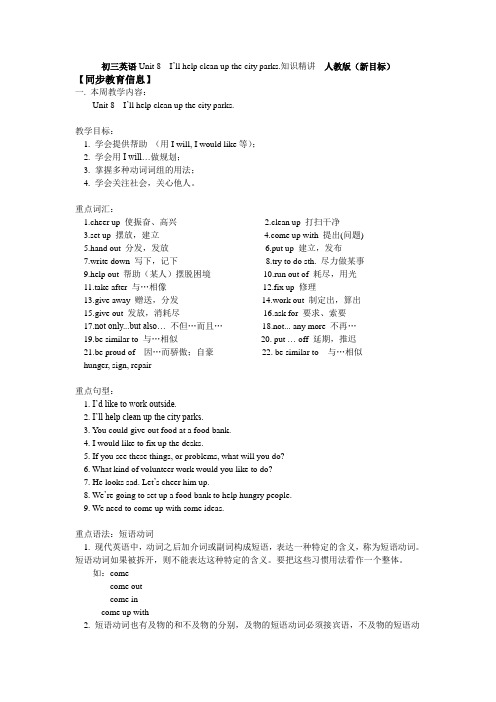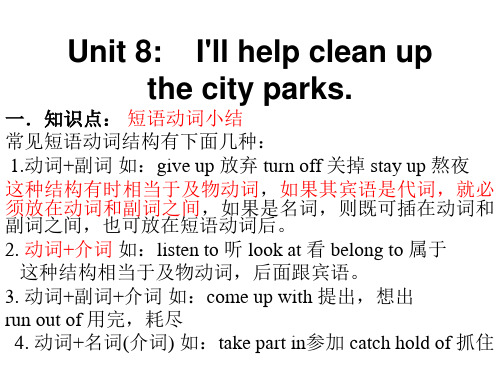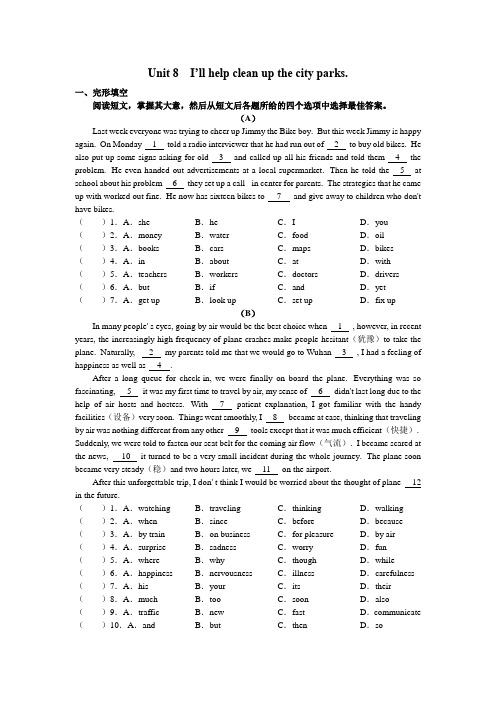《Unit8_I_will_help_clean_up_the_city_parks》课件3_人教新目标版
初三英语unit8 i’ll help clean up the city parks.知识精讲 人教版(新目标)

初三英语Unit 8 I’ll help clean up the city parks.知识精讲人教版(新目标)【同步教育信息】一. 本周教学内容:Unit 8 I’ll help clean up the city parks.教学目标:1. 学会提供帮助(用I will, I would like等);2. 学会用I will…做规划;3. 掌握多种动词词组的用法;4. 学会关注社会,关心他人。
重点词汇:1.cheer up 使振奋、高兴2.clean up 打扫干净3.set up 摆放,建立e up with 提出(问题)5.hand out 分发,发放6.put up 建立,发布7.write down 写下,记下8.try to do sth. 尽力做某事9.help out 帮助(某人)摆脱困境10.run out of 耗尽,用光11.take after 与…相像12.fix up 修理13.give away 赠送,分发14.work out 制定出,算出15.give out 发放,消耗尽16.ask for 要求、索要17.not only...but also…不但…而且…18.not... any more 不再…19.be similar to 与…相似20. put … off 延期,推迟21.be proud of 因…而骄傲;自豪22. be similar to 与…相似hunger, sign, repair重点句型:1. I’d like to work outside.2. I’ll help clean up the city parks.3. You could give out food at a food bank.4. I would like to fix up the desks.5. If you see these things, or problems, what will you do?6. What kind of volunteer work would you like to do?7. He looks sad. Let’s cheer him up.8. We’re going to set up a food bank to help hungry people.9. We need to come up with some ideas.重点语法:短语动词1. 现代英语中,动词之后加介词或副词构成短语,表达一种特定的含义,称为短语动词。
【知识学习】Unit 8 I will help clean up the city parks教案

Unit 8 I will help clean up the cityparks教案Unit8Iwillhelpcleanupthecityparks教案教学目标:、能运用以下句型进行交际。
I’dliketoworkoutside.youcouldgiveoutfoodatafoodbank.2、能从所听到的对话中获取信息。
3、掌握词汇及短语volunteer,workoutside,cheerup,helpsbwithsth,giveout,cleanup,inthehospital,comeupwith,putoff,writedown, handout,callup.教学重、难点:)wouldliketodosth.=wouldlovetodosth.I’dliketogosomewhererelaxing=I’dlovetogosomewhererelaxing.2)willdosth.表示说话者意志和意愿或者必然要发生的事,通常用“will“。
3)begoingtodosth.表示说话者打算计划要做某事、或者将要发生某事。
教学过程:(一)预习导学及自测:分发在某方面帮助某人想出推迟写下在医院打扫(二)情境导入:展示几张需要帮助的人或事的图片(如:sickpeople,homelesschildren,dirtypark,hunger)T:Doyoulikethesepicture.S:No,theymakemesad.T:whatcanyouseeinthepicture?S:Therearesomepeoplewhoneedhelp.T:canyoutellmesomethingaboutthepicture?S:Thechildrenareverypoor,theydon’thavemoneytogotoschool…(三)自主探究:教学whatcanyoudotohelpsickpeople?Icouldvisitthemintheho spital.I’dliketobuythemsomeflowers.Ihopetocheerthemup.PresentationandpracticeT:whatcanyoudotohelpthepeoplewhoneedyourhelp?Forexa mple:whatcanyoudotohelpsickpeople?S:Icouldvisittheminthehospital.S:I’dliketobuythemsomeflowers.S:Ihopetocheerthemup.S:Ivolunteerto……(让学生给出不同的回答,强调I’dliketo,hopeto,volunteerto,could和其它动词的搭配。
九年级英语unit_8_I'llhelp_clean_up_the_city_park._Period_1

A: Hello,…. I want to be a volunteer. B: So do I . What would you like to do? A: I’d like to help old people, but I don’t know what to do. B: Maybe you could help clean up their houses. A: Good idea. Would you like to go with me? visit old people’s home B: Sure, I’d love to.
How could we make more people join us?
call up(召集) our friends or classmates
send messages(发信息) to our friends or classmn advertisement make posters / advertisements
2a Listen and check (√) the things
the students are going to do.
a b
c
√
d e
√ √
2b
Listen and fill in the proper phrasal verbs.
1.We need to come up with a plan. 2.We can’t put off making a plan. Clean-Up Day is only two weeks from now. 3.I’ll write down all our ideas. 4.We could put up signs. 5.I’ll hand out advertisements after school. 6. We could each call up ten people and ask them to come.
初二英语下册Unit8_I’ll_help_to_clean_up_the_city_parks知识点详解

Unit8 I’ll help to clean up the city parkshelp sb with sth help oneself to sth随便吃&可数名词欢呼We all cheered when EXO arrived.We heard the cheers when EXO arrived.练习:He failed in the test and looks sad, let’s_____.A put him upB set him upC cheer him upD clean him up分发= hand out 散发(光、热)用完,耗尽印制出 B giving out C selling out D putting out扑灭(后接名词、代词、动名词作宾语)收起来put on穿上put out扑灭;伸出put up张贴,搭建put back放回原处可数名词:公告牌,通告,布告Take notice of what I say.notice sb doing sth/notice sb do sth…(现在不了) 没有人称和时态变化习惯于(一直在做)Be used to do被用来做Be used for+n/ doing被用于…Eg:Stamps are used for sending mails.练习:She goes to climb mountains every Sunday.But she _______ hate climbing mountains.B was used toC is used toD is used forLonely是adj孤单的(感情色彩较强)alone既是adj单独的,独自He feels lonely without friends. He is alone in the room.独自呆在房间’t feel .every强调全部、都The sun shines day this month. 这个月每天都阳光灿烂。
鲁教版七年级英语下册Unit 8 I'll help to clean up the city pa

Unit 8 I’ll help to clean up the city parks.导学案Section A【要点1】put off【经典练】选择填空:It’s a bad habit to ________ what you can do today until tomorrow.A. write downB. talk aboutC. worry aboutD. put off【巧点拨】put off意为“推迟”,由“动词+副词”构成,其后接代词时要用宾格,且将其置于put和off之间。
如:It’s difficult for us to finish the work today. We can put it off till tomorrow. 今天我们要完成这项工作很困难。
我们可以推迟到明天完成。
【超链接】常见含有put的短语有:put on穿上(衣服、鞋子等)、上演;put away把……收起来放好;put up举起、张贴;put out 扑灭、熄灭(火);put down放下等。
【要点2】used to【经典练】选择填空:She used to ________ a bus to school, but now she is used to _______ to school.A. taking; walkB. take; walkC. taking; walkingD. take; walking【巧点拨】♦used to意为“过去常常……”,其后跟动词原形。
used to do sth. 表示“过去常常做某事(暗含现在不做了)”。
如:He used to take a walk after supper. 他过去常常晚饭后散步。
♦be used to意为“习惯于……”,其中to是介词,其后接名词或V-ing形式。
be used to doing sth. 表示“习惯于做某事”。
Unit 8: I'll help clean up the city parks

• She trains her dog to fetch things. 她训练她的 狗去取东西。
• 29. at once == right away 立刻 马上 如:
• The strategies that he came up with worked out fine. 他提出的这个策略效果很好。
• ②算出,制订出,消耗完(精力等)
• He never seems to be worked out. 他好像永远不会疲 乏似的。
• He worked out a plan. 他制订了一个计划。
这种结构相当于及物动词,后面跟宾语。 3. 动词+副词+介词 如:come up with 提出,想出 run out of 用完,耗尽
4. 动词+名词(介词) 如:take part in参加 catch hold of 抓住
• 6. come up with 提出 想出 === think up 想出 • catch up with 赶上 追上 • 7. put off doing 推迟做某事 • put on 穿上 (指过程) • put up 张贴 • 8. write down 写下 记下 • 9. call up 打电话 • make a telephone call 打电话 • 10. set up 成立 建立 • The new hospital was set up in 2000. 这座医院是在2000年成立
• ②Not only you but (also) Lily likes cat. 不仅你而且莉莉喜欢猫。
• 常见的就近原则的结构有:
• ①Neither… nor…即不…也不… (两者都不)Neither you nor I like him. 我和你都不喜欢他。
【知识学习】Unit 8 I will help clean up the city parks教案

Unit 8 I will help clean up the cityparks教案Unit8Iwillhelpcleanupthecityparks教案教学目标:、能运用以下句型进行交际。
I’dliketoworkoutside.youcouldgiveoutfoodatafoodbank.2、能从所听到的对话中获取信息。
3、掌握词汇及短语volunteer,workoutside,cheerup,helpsbwithsth,giveout,cleanup,inthehospital,comeupwith,putoff,writedown, handout,callup.教学重、难点:)wouldliketodosth.=wouldlovetodosth.I’dliketogosomewhererelaxing=I’dlovetogosomewhererelaxing.2)willdosth.表示说话者意志和意愿或者必然要发生的事,通常用“will“。
3)begoingtodosth.表示说话者打算计划要做某事、或者将要发生某事。
教学过程:(一)预习导学及自测:分发在某方面帮助某人想出推迟写下在医院打扫(二)情境导入:展示几张需要帮助的人或事的图片(如:sickpeople,homelesschildren,dirtypark,hunger)T:Doyoulikethesepicture.S:No,theymakemesad.T:whatcanyouseeinthepicture?S:Therearesomepeoplewhoneedhelp.T:canyoutellmesomethingaboutthepicture?S:Thechildrenareverypoor,theydon’thavemoneytogotoschool…(三)自主探究:教学whatcanyoudotohelpsickpeople?Icouldvisitthemintheho spital.I’dliketobuythemsomeflowers.Ihopetocheerthemup.PresentationandpracticeT:whatcanyoudotohelpthepeoplewhoneedyourhelp?Forexa mple:whatcanyoudotohelpsickpeople?S:Icouldvisittheminthehospital.S:I’dliketobuythemsomeflowers.S:Ihopetocheerthemup.S:Ivolunteerto……(让学生给出不同的回答,强调I’dliketo,hopeto,volunteerto,could和其它动词的搭配。
九年级英语-Unit_8_I'll_help_clean_up_the_city_parksAlHHwA

Unit 8 I’ll help clean up the city parks.一、完形填空阅读短文,掌握其大意,然后从短文后各题所给的四个选项中选择最佳答案。
(A)Last week everyone was trying to cheer up Jimmy the Bike boy. But this week Jimmy is happy again. On Monday 1 told a radio interviewer that he had run out of 2 to buy old bikes. He also put up some signs asking for old 3 and called up all his friends and told them 4 the problem. He even handed out advertisements at a local supermarket. Then he told the 5 at school about his problem 6 they set up a call - in center for parents. The strategies that he came up with worked out fine. He now has sixteen bikes to 7 and give away to children who don't have bikes.()1.A.she B.he C.I D.you()2.A.money B.water C.food D.oil()3.A.books B.cars C.maps D.bikes()4.A.in B.about C.at D.with()5.A.teachers B.workers C.doctors D.drivers()6.A.but B.if C.and D.yet()7.A.get up B.look up C.set up D.fix up(B)In many people' s eyes, going by air would be the best choice when 1 , however, in recent years, the increasingly high frequency of plane crashes make people hesitant(犹豫)to take the plane. Naturally, 2 my parents told me that we would go to Wuhan 3 , I had a feeling of happiness as well as 4 .After a long queue for check-in, we were finally on board the plane.Everything was so fascinating, 5 it was my first time to travel by air, my sense of 6 didn't last long due to the help of air hosts and hostess.With 7 patient explanation, I got familiar with the handy facilities(设备)very soon. Things went smoothly, I 8 became at ease, thinking that traveling by air was nothing different from any other 9 tools except that it was much efficient(快捷). Suddenly, we were told to fasten our seat belt for the coming air flow(气流). I became scared at the news, 10 it turned to be a very small incident during the whole journey. The plane soon became very steady(稳)and two hours later, we 11 on the airport.After this unforgettable trip, I don' t think I would be worried about the thought of plane 12 in the future.()1.A.watching B.traveling C.thinking D.walking ()2.A.when B.since C.before D.because ()3.A.by train B.on business C.for pleasure D.by air()4.A.surprise B.sadness C.worry D.fun()5.A.where B.why C.though D.while()6.A.happiness B.nervousness C.illness D.carefulness ()7.A.his B.your C.its D.their()8.A.much B.too C.soon D.also()9.A.traffic B.new C.fast D.communicate ()10.A.and B.but C.then D.so()11.A.took B.landed C.flew D.jumped()12.A.accident B.time C.story D.speed二、阅读理解(A)()1.You can read ________ to find the new movies.A.P. 28 B.P. 12 C.P. 15 D.P. 26()2.From P. 16 you can get something on________.A.news B.sports C.people D.weather ()3.Where can you read the index?A.On TV. B.In a magazine.C.In a theater.D.In a restaurant.(B)Jane' s school day starts at eight - thirty. It begins with a group discussion of the Children' s News - round of the night before. After that, the children usually have a math or an English lesson. At ten -thirty there is a fifteen -minute break. Then the children play outside. After the break they have geography, history, or biology. In most Canadian schools the children are divided into groups that stay together all day. Each group has its own teacher, who teaches almost every subject.At twelve- fifteen the children eat their sandwiches at home or school. After that, they play all kinds of games, like marbles, skipping, ball, and tag.Jane' s school day goes on, and she starts up at one o' clock. In the afternoon, the children study French or math, or they have a music class, physical education, or swimming lessons. Sometimes they put on plays. There are two computers in the classroom. The children take turns using them. Today it is Jane' s turn to use the computer and she will work on math.School finishes at half past three. Jane goes home by bike directly.()1.Children have math after________.A.discussion B.break C.breakfast D.lunch()2.When do children have geography?A.At 8: 30.B.At 12: 15.C.In the afternoon.D.After the break.()3.After lunch, children________.A.have swimming lessons B.play all kinds of gamesC.have physical education D.play computer games()4.Children take turns ________ in the classroom.A.having lunch B.using computersC.putting on a play D.taking a break()5.We can learn from the text that children ________.A.have little chance of playing games B.study only one subjectC.learn, play and have fun at school D.all go home by bus(C)One night Matt saw his grandmother was holding a flashlight. “Are you searching for something, Grandma?” he asked. “I'm going to search for sea turtle nests(巢穴). Come with me,” replied his grandma.Matt's teacher had said there were few sea turtles left in the world, so people were helping to save them. Matt could hardly wait to search for sea turtle nests.On the way to the beach, Matt carried some wooden sticks(小棍)and a roll of wide yellow tape. While walking, Grandma described how mother sea turtles scoop a hole in the sand. Then they lay their eggs and finally cover them up with sand. In this way the sea turtle mothers make sure their eggs stay warm and safe until they hatch(孵化).“Why do you want to find the nests?” Matt asked.“We mark the nests with yellow tape to make people notice where the nests are. Without the tape to signal where the nests are, people might walk or drive on them and pack down the sand. This could hurt the eggs or cause the baby sea turtles not to be able to dig their way out after they hatch.”“After they hatch, the baby go out to the sea, following the light that shines off the ocean,”Grandma said.“People who live along the beach turn off outside lights at night during the hatching season. They want to help make sure the baby turtles go toward the light shining on the ocean.”At the beach Matt and his grandmother began searching for signs of sea turtles. Soon Matt found a wavy path near the water. Together Matt and Grandma marked the nest. They hammered tall sticks into the sand and tied the yellow tape around them.Two months later, Matt was anxious to check on the nest that he had helped mark. So that night he and his grandmother walked down to the beach under a beautiful full moon. The moonlight formed a silvery pathway from the shore out to sea. As Matt and his grandmother got to the nest, the sand began to move. From under the sand baby sea turtles came out, fighting their way to the surface(表面). As they struggled toward the water, a gentle wave picked them up and took them out to their new home.1.When Grandma asked him to search for sea turtle nests, Matt was________.A.bothered because he had to waitB.proud of his grandmother' s behaviorC.excited for he could help the creaturesD.nervous for he was not sure what to do2.Sea turtle nests were marked with the yellow tape so that________.A.visitors could easily find the turtle eggsB.the eggs would not be hurt by accidentC.the mother sea turtle could find her kidsD.Matt and his grandmother could find them3.In which order did things happen?a.The wave picked up the sea turtles to the sea.b.Sea turtles scooped a hole in the sand.c.People living along the beach turned off the lights.d.Sea turtles covered their eggs to keep them safe.e.People marked the nest with the yellow tape.A.b, a, d, e, c B.d, b, c, a, eC.b, d, e, c, a D.d, a, c, e, d4.The main idea of the text is that Matt and his grandmother________.A.helped the sea turtles hatch the eggs in the sand at nightB.saved the sea turtles and helped them find their way homeC.spent some meaningful time with the sea turtles on the beachD.took care of the sea turtle eggs and watched the babies go home三、写作训练(A)9班的同学很愿意当志愿者,他们根据自己的特长帮助别人做一些力所能及的事。
- 1、下载文档前请自行甄别文档内容的完整性,平台不提供额外的编辑、内容补充、找答案等附加服务。
- 2、"仅部分预览"的文档,不可在线预览部分如存在完整性等问题,可反馈申请退款(可完整预览的文档不适用该条件!)。
- 3、如文档侵犯您的权益,请联系客服反馈,我们会尽快为您处理(人工客服工作时间:9:00-18:30)。
work do you think I could do?
B: You could sing for the patients in
hospital.
Sample dialogue 2:
A: I like cooking. What kind of volunteer work do you think I could do? B: You could help cook for the old without children in our community.
sing for groups of people at the city
hospital to cheer them up.
The reasons why they like their work:
Not only do they feel good about
helping other people, but they get to
3c.Role Play
Sample conversation 1: A: I’d like to join the school volunteer project, but I’m not sure what I should do. B: What do you like doing? A: I like writing stories. B: Well, you could help teach young children to write.
spend time doing what they love to do; has learned more about animals; has met some wonderful people at the hospital.
Explanation
1. Being a volunteer is great! 当一个志愿者真是太好了! being a volunteer 是动名词短语; 这个动名词短语在句中作主语。它在 句中相当于一个名词,常作主语、宾 语和表语等句子成分。
Learning new words is very useful to me.
作主语 My favorite sport is swimming. 作表语 Have you finished reading the book? 作宾语
2. Not only do I feel good about helping other people, but I get to spend time doing what I love to do. (1)这是一个倒装句。一个句子以否定 副词开头时,这个句子的主谓往往要 倒装。 Never will I go there again. 我将永远也不去那儿。
country. They are great. They give
people help without hope of reward.
3. How could you help people?
I could help clean up the parks.
I hope to help sick people in the hospital.
7. give away 分发, 赠送
3a.Reading
The kinds of work the volunteers do:
Work in the after-school care
center, helping young children to
read; work in an animal hospital;
请帮我搬一下这张桌子。
(2)clean up 意为“打扫;清理”。 Please clean up your bed and clothes. 请整理一下你的床铺和衣服。 但如果在clean 和up间加个连字符 号, 它就是名词了, 意为“扫除”。 You must give your classroom a good clean-up. 你必须对教室进行彻底地打扫。
A: I love music.
B: Well, you could sing some beautiful songs for the patients in hospital.
Writing and Speaking
Sample dialogue 1: A: I like singing. What kind of volunteer
Explanation
1.You could help clean up the city park. 你可以帮助清理城市公园。 (1)动词help后可以接动词不定式作 宾语或作宾语补足语,这时不定式的 标志to可以省略也可以保留;help sb. with sth. 意为“帮助某人做某事”。
Their father helps the children with their work. 孩子们的父亲帮助他们做功课。 Please help me to move this table.
Unit 8 I’ll help clean up the city parks.
1. What can you see in these pictures?
There are some people who need help. 2. Do you want to be a volunteer? Yes, we have heard of many good deeds done by volunteers all over the
4. We could ______ signs. put up 5. I’ll ________ advertisements after hand out school. call up 6. We could each _______ ten people
and ask them to come.
你必需亲自见他吗?
(2)need用作情态动词,意为“必 须”、“必要”,没有人称、数的变化, 后接不带to 的动词不定式。 通常用于 疑问句和否定句中,构成疑问句和否定 句时,不需要使用助动词。 Need you go to the park with your classmate? 你必须和你的同学去公园吗?
Grammar Focus
Phrasal verbs: 1. cheer up 使高兴
2. set up
建立
3. come up with 提出 4. run out of 用完, 耗尽
5. take after (外貌, 性格等) 与
(父母) 相似
6. fix up 8. work out
修理, 修补 结局, 至最后, 结果为
Little does he care about what others think. 他很少考虑别人是怎么想的。 (2) get to 表示一个动作发生的过程。 I get to love Sandwiches now. 我现在有一点喜欢三明治了。 They soon get toቤተ መጻሕፍቲ ባይዱtalk together. 他们不久就在一起谈起来了。
Sample conversation 2: A: I’d like to join the school volunteer project, but I’m not sure what I should do. B: What do you like doing?
A: I love movies.
could help clean ____ the city parks. up
2. I’d like to _____ homeless people. help You could give out food at the food ___ bank.
up 3. I’d like to cheer ____ sick kids. You
1c.Oral Practice
Sample dialogue 1: A: I would like to work outside. B: You could help plant trees and grass to beautify our hometown.
Sample dialogue 2: A: I’d like to work in the hospital. B: Then you could help cheer up the patients.
I’d like to cheer up sick kids.
I volunteer to give out food.
I’ll help kids with their schoolwork.
1b.Listening
1. I’d like to _____ outside. You work
B: Well, you could share the interesting parts with children.
Sample conversation 3: A: I’d like to join the school volunteer project, but I’m not sure what I should do. B: What do you like doing?
【注意】 由need引出的疑问句,答语 表肯定时用must或have to;表示否定 时用needn’t或don’t have to。 A: Need I come to work tomorrow? 明天我需要来上班吗? B: Yes, you must / have to. 是的, 你必须来。
